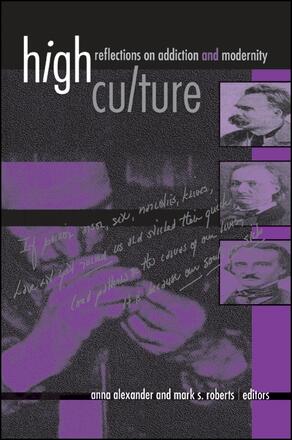
High Culture
Reflections on Addiction and Modernity
Alternative formats available from:
Addresses the place of addiction in modern art, literature, philosophy, and psychology, including its effects on the works of such thinkers and writers as Heidegger, Nietzsche, DeQuincey, Breton, and Burroughs.
Description
This is the first comprehensive text to address addiction and its multiple effects on and extensions into art, literature, philosophy, and psychology. Most research into addiction has taken place within the disciplines of medicine, criminology, politics, and social psychology. When seen from a broad cultural perspective, however, addiction emerges directly alongside modernity, haunting its various discourses of digression, dissent, and the transcendence of the commonplace. Who could even imagine modern writing without the addictive, visionary excesses of writers like Baudelaire, DeQuincey, Poe, Burroughs, or Artaud? Or, for that matter, modern culture without its "outsiders," its incorrigible addicts, its defaced subjects: smokers, users, overeaters, alcoholics, the insane? Taking a cultural studies approach to addiction, High Culture offers a readable and accessible collection of essays on these socially marginalized practices and discourses so central to modernity.
Anna Alexander teaches at the Simone de Beauvoir Institute, Concordia University in Montreal. Mark S. Roberts teaches in the Department of Philosophy at State University of New York at Stony Brook.
Reviews
"This book does something that few works on addiction have done since the 1970s: take seriously the drug-induced or modulated experience—not just as meaningful to drug users and their immediate social groups, but as revealing something important about existence, consciousness, and subjectivity. The writers in this volume have made a new incursion into this area of exploration. " — Medical Humanities Review
"This book unveils a latent but profoundly significant—and largely ignored—dimension of modernity, namely, the relationship to addiction. The contributors focus important new light on a dimension of modern life that is omnipresent and at the same time profoundly neglected. This is crucial scholarship—applied philosophy—and powerful testimony that philosophy has much to say about everyday life. " — Michael Dorland, Carleton University
"This is a useful, multifaceted collection foregrounding a phenomenon that is too little examined from a philosophical or theoretical point of view—if anything deserves attention in the growing literature devoted to cultural criticism, it is addiction. " — Babette E. Babich, author of Nietzsche's Philosophy of Science